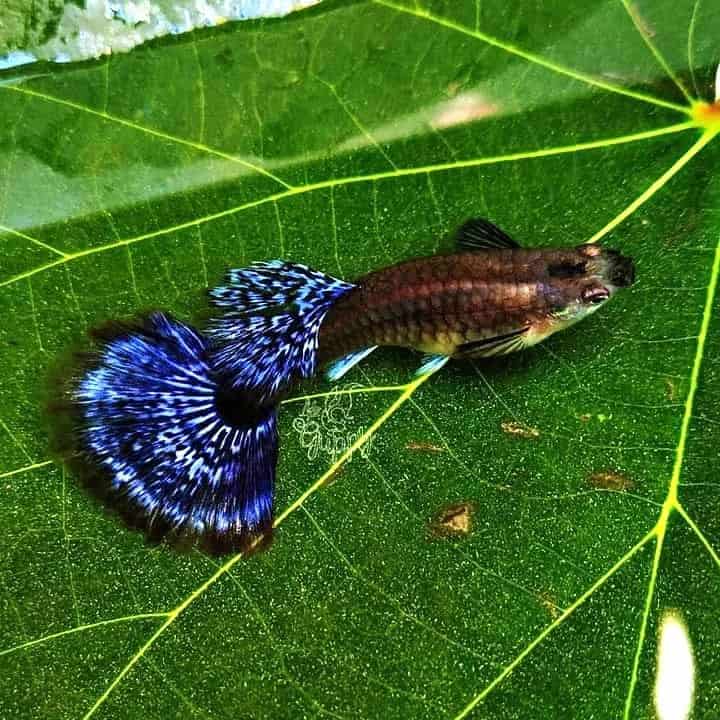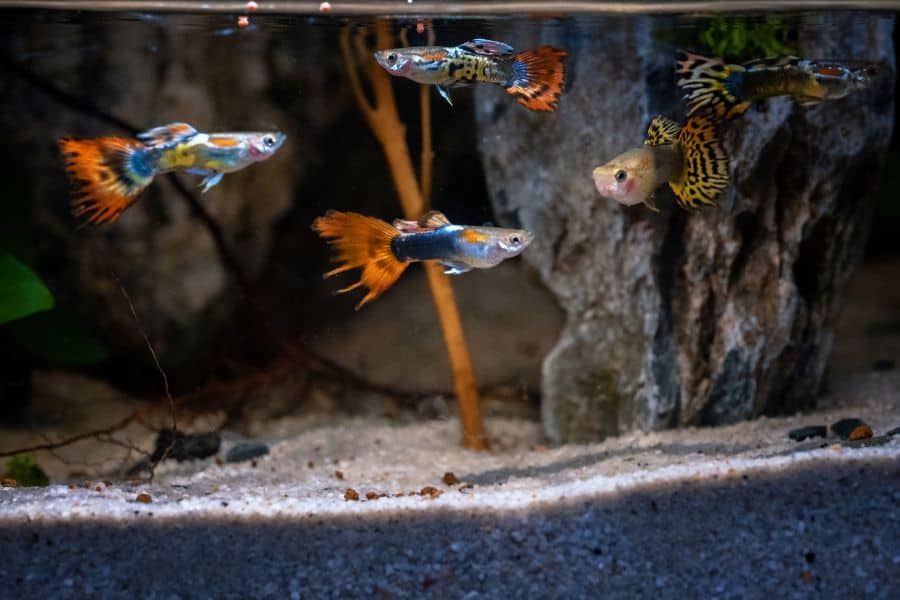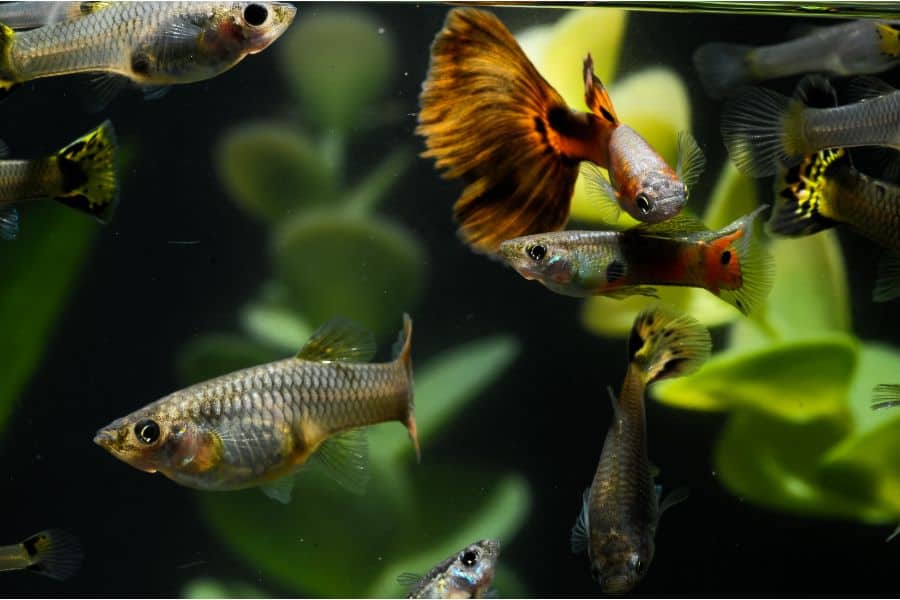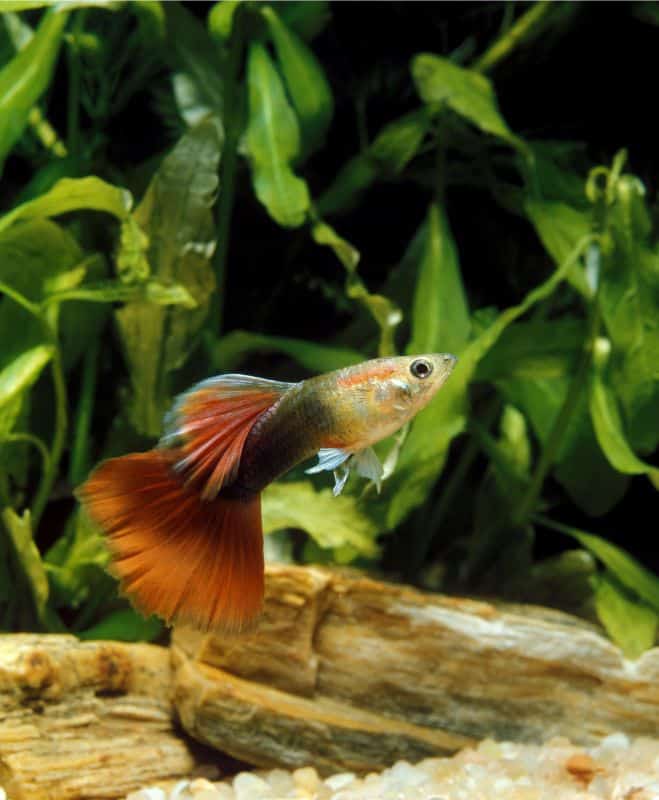Guppies are called Millionfish since they reproduce and multiply fast. But could these colorful fish live for a million years?
No. In general, Guppies can only live anywhere from 2 to 3 years. But there’s so much more than just knowing their longevity since there are factors that can either shorten or prolong their life.
In this article, you will not just learn what these factors are, but you will also have a better understanding how they influence the lifespan of Guppies.
Wild Guppy Lifespan and Its Affecting Factors
Living only for 1 to 2 years, the lifespan of wild Guppies is shorter than their average life expectancy. But you may wonder why? It is due to several factors that become a survival challenge for Guppies in the wild, like:
Predation
Predation is one of the main factors affecting the lifespan of Guppies in the wild. Given their tiny size, Guppies are often preyed upon by larger fish, birds, and aquatic insects like water bugs, beetles, and scorpions.
In the event that there are too many predators in a particular body of water, the chances of Guppies being caught and eaten increases. In effect, the overall lifespan of Guppies living in that particular body of water becomes shorter.
Availability of Food
For Guppies to live to their life expectancy, they should have ample sources and variety of food. However, we must remember that food is not always available in the wild and their availability fluctuates according to seasons. Some seasons bring in more food, while food in some seasons is scarce.
In the event that food scarcity is prolonged, Guppies may experience nutritional stress that weakens their immune system and shortens their lifespan.
Quality of Habitat
Guppies do not necessarily need a pristine ecosystem. In South America where Guppies originated, they thrive in streams, ponds, and rivers that have been subjected to various human activities.
Deforestation, overfishing, pollution and the introduction of invasive species are some of the human-induced factors that can deteriorate the habitat which affects the health and shortens the lifespan of Guppies.
Attack of Diseases and Parasites
Wild habitats are open systems that interact with the exchange of materials, energy and organisms including parasites, bacteria and viruses.
It is why wild Guppies are constantly exposed to the possibility of contracting diseases and infection. It is only a matter of time when their immune system weakens and they can become sick.
This particular factor is relatively serious since it has long-term effects and may potentially wipe out an entire local population of not just Guppies, but other fish as well.
Reproductive Pressure
Guppies are known for how fast they reproduce and multiply. However, when you sum up all the factors mentioned above, their reproductive success may be compromised.
Adapting to their changing environment in the wild, Guppies will try to maximize their reproductive success by reproducing at an earlier age. In effect, it accelerates their aging process and significantly reduces their lifespan.
What is alarming with this particular factor is that it will not just affect an individual fish, but it can potentially affect the next generation of Guppies.
Life Expectancy in Tank-Bred Guppies
There is a big difference between the life expectancy of wild Guppies between tank-bred Guppies for one reason: tank-bred Guppies are raised in an enclosed system where parameters are managed and controlled. The fact is that tank-bred Guppies are pampered and it is why they can live from 2 to 3 years.
Moreover, since Guppies are selectively bred to come up with a particular trait, their longevity has also improved, where some of the long-lived Guppies can go 5 years old.
But this doesn’t mean that you can buy your Guppies today and expect that they can live up to 5 years from now. No. Even if your tank is an enclosed system, there are still factors that can shorten (perhaps prolong) the life of your Guppy fish.
Genetic Impact on Guppy Longevity
The genetic makeup of a Guppy greatly influences their lifespan. Since they are commonly crossbred, next generation Guppies inherit the traits of their parents which dictates if they are resistant to diseases and resilient to environmental change to name a few.
If a Guppy has favorable genetic traits, then it may have a higher chance of living longer. In most cases, guppies with weak genetics will die before they reach sexual maturity.
While you can do nothing about genetics, you can still address this by buying your Guppies only from expert breeders known to produce healthy guppies with good genetics.
Tank Environmental Factors Affecting Guppy Lifespan
Your tank is a closed system and the environmental condition your Guppies are exposed to are basically your water parameters. The good thing is that you can control this and the longevity of your Guppy will depend on how well you manage these factors.
Organic Compounds
Ammonia, Nitrite, and Nitrate are the major organic compounds we should be concerned with since they occur naturally as a by-product of fish respiration.
At normal levels, these substances do not harm your Guppy. For reference, the ideal ammonia and nitrite level for Guppy is 0 to under 0.5 ppm, while nitrate should be kept below 25 ppm. If their levels increase, they become toxic and directly affect the health of your fish.
Specifically, ammonia causes body tissue damage, nitrite interferes with the transportation of oxygen in the bloodstream, and nitrate affects the reproductive health of your Guppy.
In summary, the effects of excess organic compounds impact the longevity of your Guppy. So, be sure you address it and maintain the levels of these substances within tolerable limits.
Temperature
Guppies are ectothermic animals. It means that the regulation of their body temperature depends on external sources. When they are exposed outside of their temperature range (which is 22 – 28 C or 72 – 82 F), their metabolism is affected, and this is more pronounced in Guppy Fries since they are highly sensitive to temperature change.
For those who are living in tropics, be aware that exposing your Guppies in warmer temperatures accelerates aging and shortens their lifespan. Well, you can easily address this by using an automatic thermostat regulator.
pH and Hardness
These parameters are not really talked about when taking care of aquarium fish. Well, some do. However, with Guppies, maintaining them at their ideal level (pH from 7 to 8 and gH from 8 to 12) can prolong their life.
In case you disregard these parameters, be aware that acidic water damages the respiratory system of Guppies, highly alkaline waters reduce their immune function, and hard water causes stress.
Improving Guppy Lifespan Through Nutritional Feeding

Proper nutrition is essential for the overall health and longevity of your Guppies. If you adequately feed your Guppies, they will be able to maintain a robust immune system that shields them against bacterial, fungal, and parasitic infections, therefore prolonging their lifespan.
Further, proper feeding will result in female Guppies producing more healthy fries which is important in the survival of their next generation.
On the other hand, underfed Guppies can lead to malnutrition and significantly reduce their longevity.
Knowing this, feed your Guppies with high quality foods like commercial fish foods that have a balanced concentration of protein, fats, and carbohydrates, live and frozen foods.
Similarly, you can give them supplements (like micronutrients, vitamins and minerals) that could boost their immune system and overall health.
Diseases and How it Shortens Guppy Lifespan
Bacterial (like white spots) and fungal infections (like tail rot) are some of the diseases commonly suffered by Guppies. While they can be treated with antibiotics, they can either lead to mortality or create long term effects.
If your Guppy is still alive while suffering from a disease, do not think they are lucky as they may be dying slowly without your knowledge.
First, they may lose their appetite. Second, their immune system weakens and their ability to fight diseases becomes low.
Third, organ failure can occur, which in most cases, death is often the result. And worst, diseases will not just affect the present population, but also the upcoming generations as it can be transmitted to their offspring.
Guppy Lifespan as Influenced by Social Environment
Your tank would seem the perfect sanctuary for your Guppies. But little do we know that its enclosed social environment can become the very ingredient that reduces their lifespan.
Usually, these socially-induced triggers are in the form of stress, and you may ask: How is it possible to create stress in your Guppy tank? Surprisingly, there’s a lot and it all boils down to two factors:
Overpopulation
Colorful Guppies are great to look at when they are in a group and it is why we tend to overpopulate them in our tank. However, this will mean that it will fiercely compete for food, space and other resources.
In effect, only a few Guppies will dominate and the rest do not get the necessary resources, leading to their shortened lifespan.
On top of this, more fish means more ammonia by-products and you already know what the consequences are if the level of organic substances are elevated.
If possible, practice the ideal stocking density for Guppies which is 1 fish for every gallon of water.
Incompatible Tank Mates
Guppies are one of the many ideal fish in a community tank. With their peaceful behavior, they can easily get along with other fish. But how about other fish getting along with Guppies?
While you may think that Guppies are safe from their wild predators, their incompatible tank mates would become their hunters.
Some of the fish that do not match with Guppies include large predatory fish (Cichlids and Oscars), fin nippers (Barbs and Danios), and those that are aggressive and territorial (like Bettas and Gouramis).
Also Read: Guppy Fry
FAQs
How Does Overfeeding Affect Guppy Lifespan?
Overfeeding your Guppies can have detrimental effects on their health and affect their lifespan. Feeding them too much food leads to obesity, digestive problems, and a weakened immune system making them susceptible to diseases. Aside from this, you can expect a lot of uneaten food that can deteriorate water quality.
Which Lives Longer: Guppies from Pet Shops or From Breeders?
Although Guppies from pet shops are high-quality, we must remember that these are business entities and always consider profit and sales on their table.
With breeders, they are more into dealing with genetics and their fad is selecting the best genes for their customers. It is no wonder why Guppies from breeders live longer than those in pet shops.
Final Thoughts
We know we have bombarded you with a ton of details regarding the lifespan of Guppies. Now, it’s time to ease up, spend time enjoying your Guppies, and give them the care they need.
Not only are you prolonging their life, but you are also creating memories and experiences that will enable you to handle the next generation with more knowledge, confidence, and skills.


